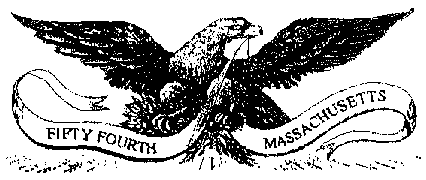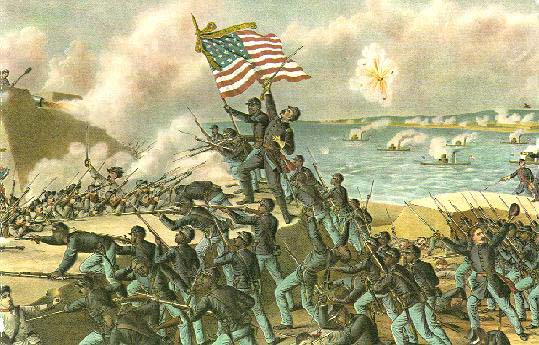Sarah LuriaAssociate Professor, Department of English |
"Bell-cheeked Negro infantry"
Currier and Ives' famous engraving of the 54th Massachusetts Regiment Storming Fort Wagner, S.C. July 18, 1863 (image source: http://extlab1.entnem.ufl.edu/olustee/pics/btrywgnr.jpg) The 54th Massachusetts Regiment was one of the first black regiments recruited after President Lincoln announced in his Emancipation Proclamation (Jan. 1, 1863) that the Union would permit African-American men to fight. "The 54th," as it came to be known, became the most famous of the black regiments due to its heroic performance leading the assault on Fort Wagner in South Carolina in 1863. The regiment had 600 men; 272 of these, including Col. Robert Shaw, were killed, wounded or captured during the assault. The first black regiments had the burden of proving that African-American men would make fit soldiers and could be trusted to handle a gun; the Fifty-fourth made it clear that that was the case. Using the Fifty-fourth to lead the charge has led some people to question whether African-Americans were seen as expendable and used for the most difficult assaults. Civil War historian Peter Burchard argues that evidence suggests African-Americans were not sent into battle more often than whites. He reminds us that any number of the War's battles "might be seen as a hopeless, bumbling sacrifice of men" (qtd. Lincoln Kirstein, Lay this Laurel, (New York: Eakins, 1973), introduction). That said, black soldiers did not receive the same pay as white soldiers, until an act passed by Congress in 1864. Serving in the Fifty-fourth were two sons of the famous abolitionist Frederick Douglass and the brother of William and Henry James. The regiment received further fame with the film "Glory" (1989) which told the story of the regiment's creation and assault on Fort Wagner. |

